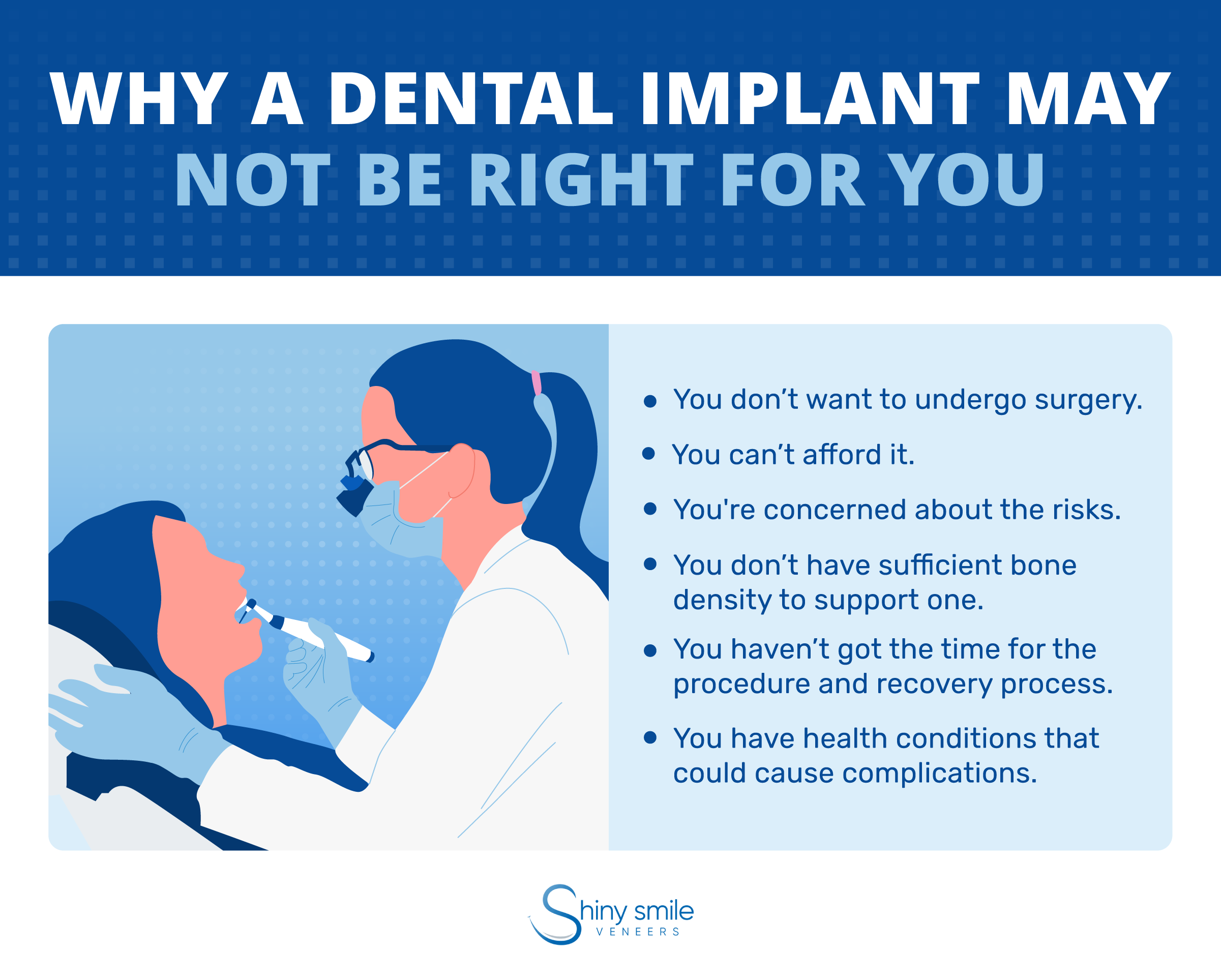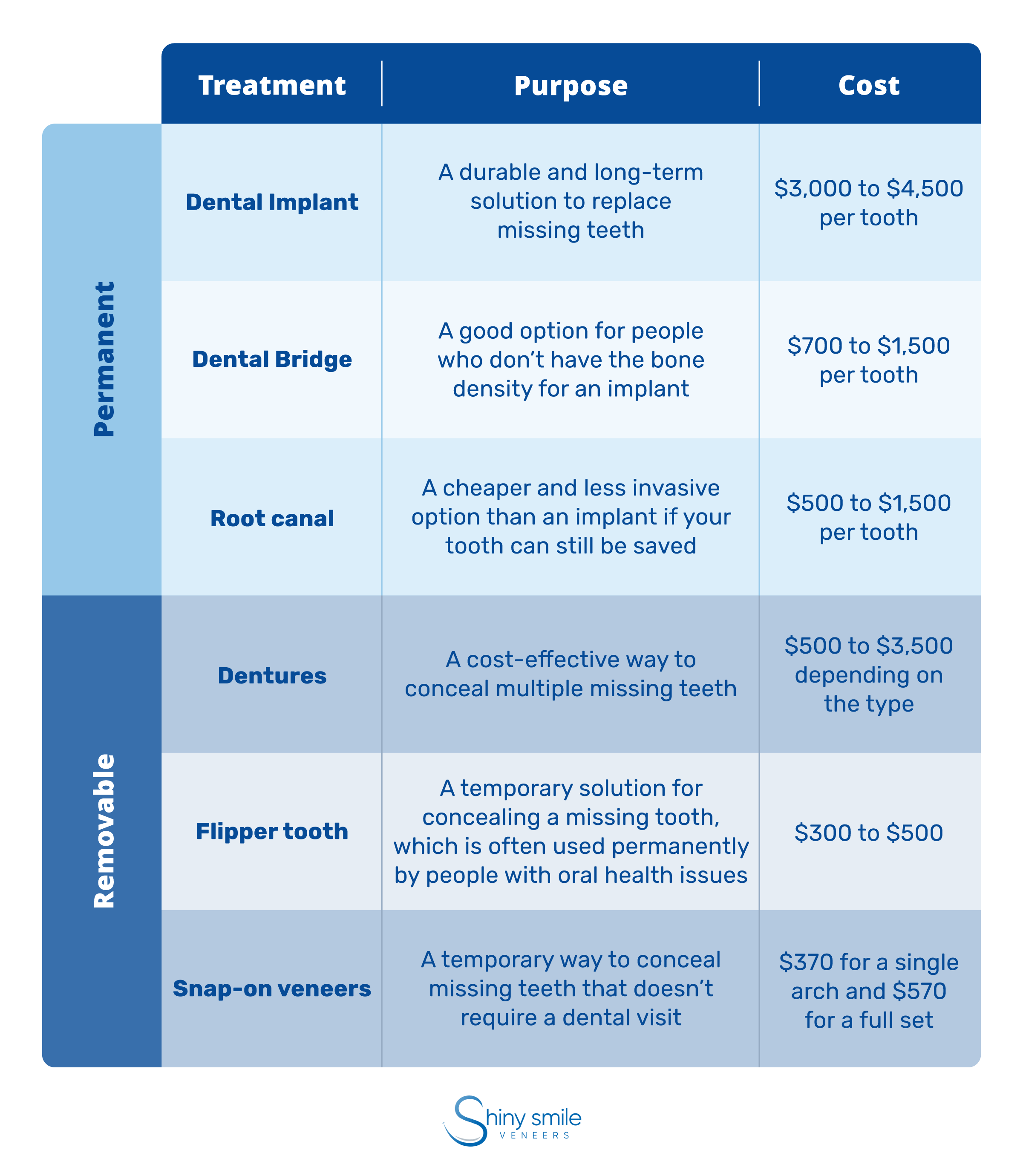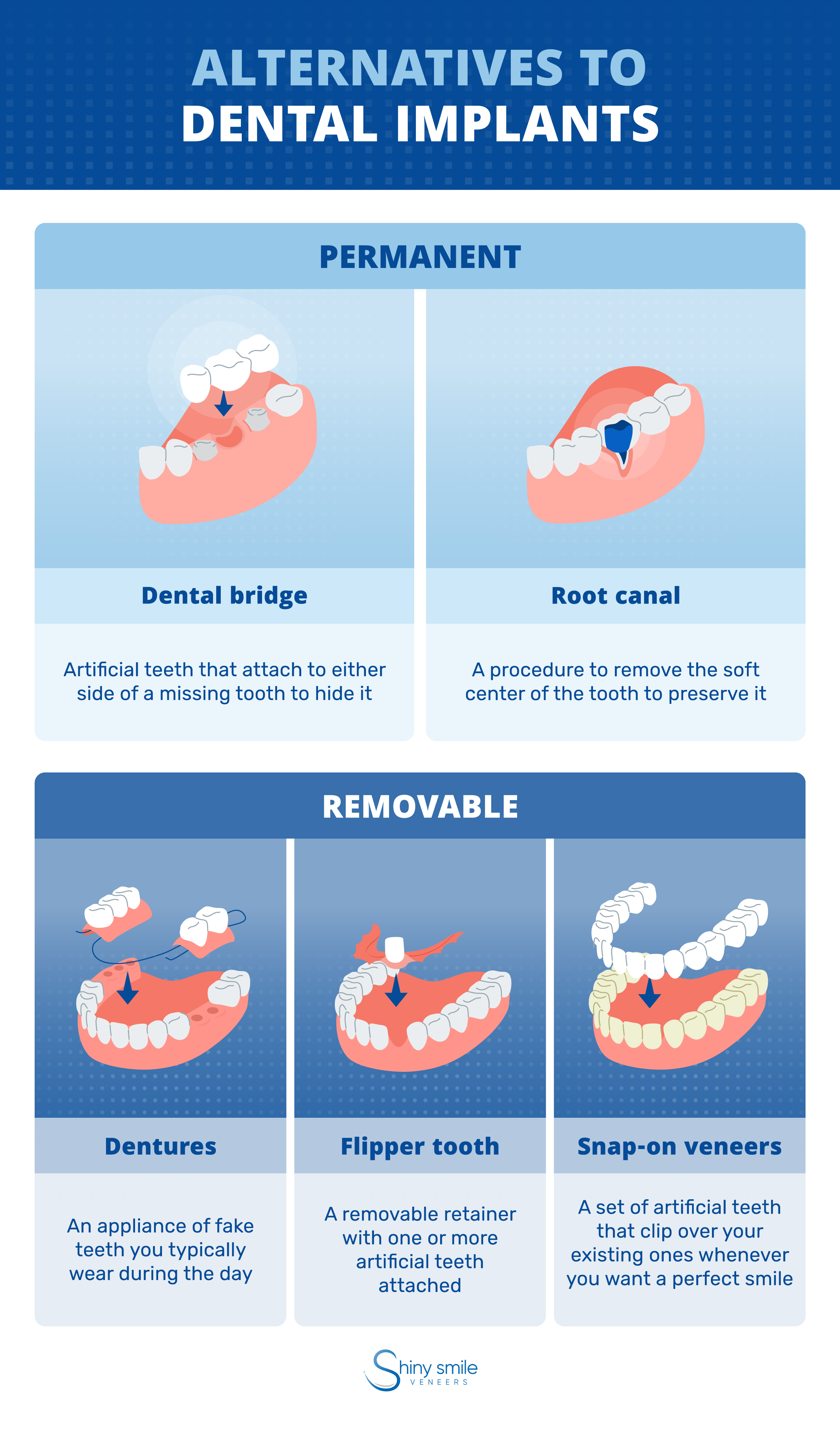

Dental implants are artificial tooth roots. Used to replace missing teeth, they’re surgically placed in your jaw. Then an abutment connects it to an artificial new tooth, also called a crown.
Implants can help with problems like bone loss, chewing pattern changes, and speech issues. While they’re effective, natural-looking, and durable, getting implants is generally expensive and requires surgery, which comes with some risks.
In this post, we go over more affordable and less invasive alternatives to dental implants, so you can make the best choice for your smile.
Table of Contents
- Why a Dental Implant May Not Be Right For You
- Dental Implants vs Alternatives
- Permanent Alternatives to Dental Implants
- Removable Alternatives to Dental Implants
- Which Dental Implant Alternative Should I Choose?
- Get a Confident Smile Instantly
Why a Dental Implant May Not Be Right For You
Though dental implants are an effective dental treatment in many cases, they may not necessarily be right for you. If any of these reasons apply to you, you might want to consider an alternative option to dental implants:

- You don’t have sufficient bone density. Dental implants require a strong, sturdy jawbone in order to hold properly.
- They require surgery. The dental implant procedure requires surgery to place, and you may not want to deal with the risks or complications, like taking time off work for the procedure and adjusting your diet or waiting for your mouth to heal after the fact.
- Health conditions can cause complications. Conditions like diabetes, gum disease, poor oral health, and heart problems may increase the risks of infection or of the implant not being successful.
- They’re expensive. Dental implants can cost $3,000 to $4,500 per tooth. Because they’re considered a cosmetic procedure, they may not be covered by your insurance.
- The procedure takes time. Getting implants can involve more than one surgical procedure. It could take several months to a year to get your implants done, including recovery time.
- There are risks. Surgery comes with risks of injuries to your jaw, gums, or surrounding teeth, as well as post-surgical numbness caused by nerve damage.
Dental Implants vs Alternatives
Everyone’s situation is different, so it’s important to consider all of your tooth replacement options and consult with your dentist about what’s right for you. Here’s an overview of how dental implants compare to some of the main alternatives.

Permanent Alternatives to Dental Implants
Dental implants aren’t the only permanent solution to broken or missing teeth. Dental bridges and root canals are also permanent solutions to consider.
1. Dental Bridges
A dental bridge is a common dental implant alternative. It works for people who don’t have the bone density to get implants. A dental bridge replaces missing teeth by bridging the gap over your missing tooth.
There are three types of dental bridges:
- Traditional dental bridge: The most common type of dental bridge, this consists of dental crowns or caps on each end with artificial teeth, also called pontics, in between. Your dentist binds the caps to your natural teeth, while the artificial ones fill in your gap.
- Cantilever dental bridge: Similar to a traditional bridge, a cantilever dental bridge only has a crown on one end. It’s used in cases where you only have existing teeth on one side of the gap.
- Maryland dental bridge: The Maryland bridge uses metal wings to bind to the backs of your adjacent teeth instead of crowns. It’s weaker than a traditional bridge, and typically used to replace missing front teeth.
Getting a dental bridge requires local anesthetic, but it’s less invasive than dental implant surgery. The number of dental visits you’ll require and what’s involved in the process depends on the type of bridge you get.
Dental bridges cost $700 to $1,500 per tooth, and may be partially covered by insurance. They typically last 5 to 15 years.
2. Root Canal
If your natural tooth can be saved, getting a root canal may be a cheaper and less invasive option than getting an implant.
A root canal treats inflammation or infection by removing the pulp of the tooth, the soft center of nerves and blood vessels, while preserving the tooth’s structure. Your pulp may be damaged by problems like untreated decay, chips and cracks, and injuries.
This dental procedure requires local anesthetic and involves the tooth being opened and sealed. The cost of a root canal ranges from $500 to $1,500 depending on the tooth and the dentist, and it may be covered by insurance.

Removable Alternatives to Dental Implants
Though removable treatment options aren’t permanent fixes, they’re generally more affordable and offer more flexibility than dental implants. Here are a few removable alternatives to consider.
3. Dentures
If you have multiple teeth to replace, dentures might be a good option. Dentures are a removable appliance that fits over your gums to replace lost teeth. They’re cost-effective and provide realistic-looking fake teeth.
There are several types of dentures, including some that can be attached to dental implants. The main types are:
- Full dentures: The most conventional type of denture, a full set of dentures replaces an entire arch of missing teeth and attaches to your gums.
- Partial dentures: When you don’t need full coverage, partial dentures can replace several missing teeth, attaching to your gums and underlying bone using special clasps.
- Implant-supported dentures: If you don’t want to remove your dentures at night, you can get permanent dentures that attach to implants and can only be removed by a dentist.
Getting dentures is a time-consuming process. It requires several appointments to take impressions, create a model, and fit the final dentures. They don’t require surgery or anesthetic.
Dentures have to be removed at night and soaked in a denture solution to keep them clean and safe to use. However, because they’re removable, they may shift in position while you’re wearing them. They also may cause your jawbone to shrink over time, affecting your appearance.
If you have a pair of dentures made, they usually need to be reevaluated for fit and condition every five years. Dentures usually cost $500 to $3,500 depending on the type, but may be covered by your insurance.
4. Flipper Tooth
A flipper tooth is a different type of temporary partial denture. It’s a retainer that fits on your jaw and has one or more artificial teeth attached to it.
Flippers are usually used as a temporary solution while you wait for an implant or bridge. They can be used on a more permanent basis if you’re not a candidate for permanent options due to dental health issues.
Using a flipper can sometimes be uncomfortable or feel loose in your mouth, but, in addition to covering cosmetic concerns, they can help you chew. They typically cost $300 to $500 and may be covered by insurance.
5. Snap-On Veneers
Snap-on veneers are the most affordable alternative to dental implants. They’re an appliance that fits over your teeth to give you a perfect smile in a shade of your choice, so they can easily match your existing teeth.
These veneers can conceal concerns ranging from mild dental issues to several missing teeth. They aren’t the right option if you have more severe dental problems or many missing teeth.
On the whole, they’re a temporary solution. You may still need to replace a missing tooth with a more permanent fix to prevent bone loss or other complications.
Snap-on veneers also come with convenience you can’t get from other procedures. You can order them online and get a perfect fit using an impressions kit at home, so you don’t even have to go to a dentist or risk any discomfort or complications like with an implant.
While they may not be covered by your insurance, they’re generally affordable. A full set of Shiny Smile veneers cost $570, and they last one to five years (or longer) with regular use.
Which Dental Implant Alternative Should I Choose?
The best alternative for you depends on a variety of factors, like your budget, the severity of your dental issue, and what you’re personally looking for in a solution.
For example, if you don’t have sufficient bone density to get dental implants, or have other health issues, dental bridges are good options that are cheaper and less invasive. If you don’t want to have a tooth removed, you may be able to save it and get a root canal.
Removable options like dentures and flipper teeth give you flexibility, especially if you have several missing teeth or need to have multiple teeth removed. However, they’re not always comfortable and need special maintenance.
If you’re looking for an instant, temporary fix for dental issues and missing teeth, snap-on veneers may be your best option. Even if you’re considering a more permanent solution, you can use veneers to get a bright white smile right now as you wait. Shiny Smile Veneers cost $370 for a single arch and $570 for a full set (top and bottom).
Get a Confident Smile Instantly
Dental problems aren’t just limited to your oral health — they can also affect your confidence. No matter where you are on your dental care journey, Shiny Smile Veneers can help give you the smile you deserve. Order your at-home impression kit to start the process today, and you’ll be well on your way to getting your beautiful smile back.

